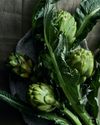
My family never had any grand plan to be in the restaurant game. Parwana began with my mother Farida (pictured above) and her intuition that, as migrants to Australia, it was increasingly important that we preserve the customs, flavours and essence of our Afghan cuisine, and also share it with those in our new home. She carried with her a generationally engrained love for her traditional food and the rituals that sit alongside it. This, combined with our experience as displaced people, witnessing first-hand the scattering effects of war on Afghanistan’s memory and culture, coaxed Parwana into being. In this way, Parwana was driven by commemoration, reconciliation and creativity, tinged with a mixture of loss and hope.
However, in hindsight, the strands of the idea had long existed in many guises, and had been finding their way to us to consolidate and express, well before we opened the doors to Parwana in 2009. The restaurant, and the food we shared, was a manifestation of the immense history of cross-pollination and cultural exchange that underpinned Afghanistan’s history at the centre of the ancient Silk Road. As time marched on and change unfolded on the land, including the emergence of Afghanistan as a nation-state, this was captured in the cuisine and the traditions surrounding it. By the time the heavy clouds of conflict gathered overhead, my family had migrated to Australia – and, with the emotions of exile, whose challenges and opportunities were now ours to carry, food took on a new poignancy and significance. Food was never static, but an ever-evolving way to stay anchored to our history while filling our sails with hopes for tomorrow. For us, food had become a means to tell a bigger story. This book contains not only recipes, but also the history and energies that lie behind them.
This story is from the {{IssueName}} edition of {{MagazineName}}.
Start your 7-day Magzter GOLD free trial to access thousands of curated premium stories, and 9,000+ magazines and newspapers.
Already a subscriber ? Sign In
This story is from the {{IssueName}} edition of {{MagazineName}}.
Start your 7-day Magzter GOLD free trial to access thousands of curated premium stories, and 9,000+ magazines and newspapers.
Already a subscriber? Sign In

From personal experience
Former Hope St Radio chef ELLIE BOUHADANA invites you to gather your loved ones and enjoy an evening of good food and laughter with recipes from her new cookbook, Ellie's Table.

Kimberley Moulton
Kylie Kwong celebrates the individuals helping to grow a stronger community. This month, we applaud the international curator and Yorta Yorta woman who is shining a light on First Peoples.

Tom Wallace
We share a drop with the head winemaker for Devil's Corner, Tamar Ridge and Pirie Sparkling, a master of cool-climate grapes.

Best in class
The top drops to keep an eye out for on wine lists (and why they're worth the splurge)

A taste of refuge
Fleeing war and persecution, Australia's new arrivals push our food culture forward. DANI VALENT explores the contributions of the country's refugee communities.

BE OUR GUEST
Inspired by the sense of place conjured by Europe's Michelin-star restaurants, local restaurateurs are expanding their hospitality remit to include accommodation

Barcelona BUZZ
A popular drawcard for digital nomads and expats alike, the Catalonian capital offers equal parts sophistication and fun. Here, DANI VALENT discovers the latest dining hotspots.

HEATHCOTE BOUND
MICHAEL HARDEN hits the road to explore regional Victoria's Heathcote, home to this year's Best Destination Dining and a host of other delights.

The art of...relishing restaurants
Does working in hospitality make someone a better or worse diner

HEART AND SOUL
Not a vegetable but rather a flower bud that rises on a thistle, the artichoke is a complex delight. Its rewards are hard won; first you must get past the armour of petals and remove the hairy choke. Those who step up are rewarded with sweet and savoury creaminess and the elusive flavour of spring. Many of the recipes here begin with the same Provençal braise. Others call on the nuttiness of artichokes in their raw form. The results make pasta lighter and chicken brighter or can be fried to become a vessel for bold flavours all of which capture the levity of the season.